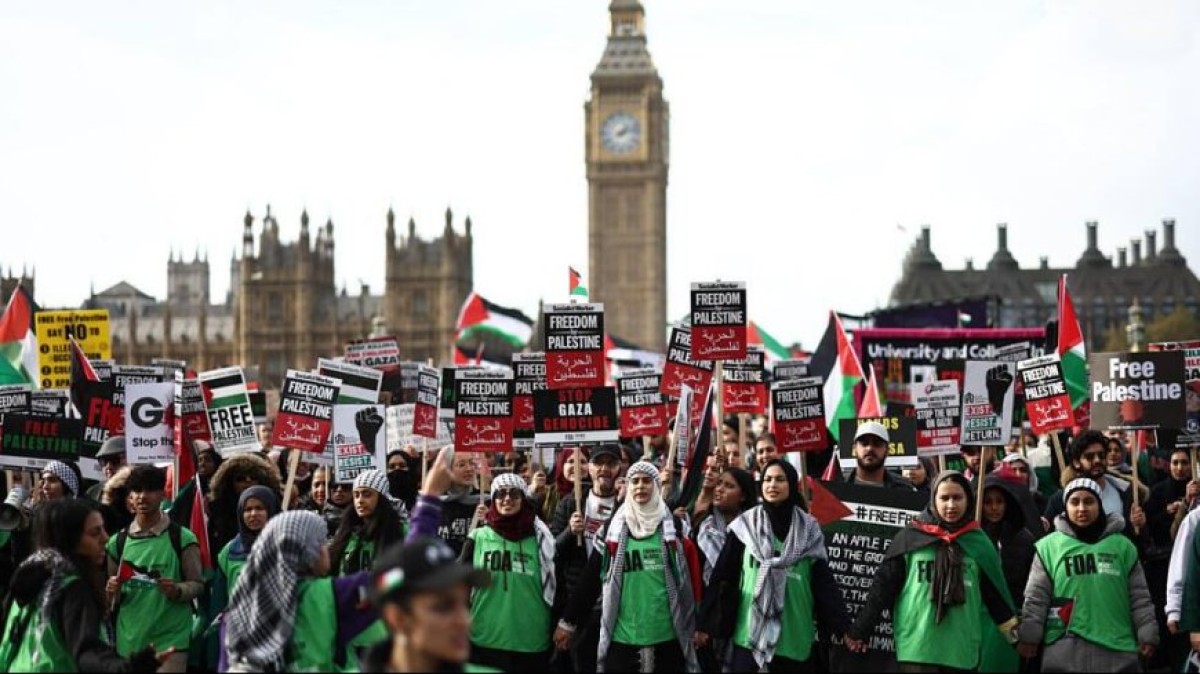 164
164
Israel's War Crimes and Britain’s Domestic Conundrum: Lessons for Europe
More than a month has elapsed since the outbreak of the Israeli onslaught against civilians living in the Gaza Strip, and its reverberations are becoming increasingly apparent in various countries, particularly those within Europe. Remarkably, it is within the UK that the implications of this war have initially manifested themselves, serving as a potential harbinger for other European nations. Britain's extensive and virtually unflinching support for Israel traces back to a period predating 1948. Indeed, one can argue that the British government has consistently assumed the role of a crucial advocate for Israel, a relationship that has deepened since the 1917 Balfour Declaration. In furtherance of bolstering cooperation and support, the British government entered into a long-term agreement with Israel. This roadmap, indicative of the "strategic partnership" forged at the time of signing in November 2021, has contributed to the strengthening of ties between London and Tel Aviv.
By: A. Mahdavi
Moreover, Israel's investments in Britain have yielded economic benefits, deepening the bond between the parties. Additionally, Britain extends military and logistical assistance to Israel, exemplified by the presence of the Royal Navy aircraft carrier deployed in the Mediterranean Sea to support Israel's operations in Gaza.
Conversely, as Israel's war crimes in Gaza continue to draw international condemnation, the backlash and animosity against the Zionists escalate, thereby posing challenges for their supportive governments in the West, namely the UK government. Despite the media's portrayal of Israelis, mounting pressure and public awareness have generated predicaments for these governments.
Indeed, endorsing such acts of barbarism and genocide can prove exorbitant for 10 Downing Street. Presently, one of the consequences arising from these circumstances is the emergence of a wide schism within European societies, particularly evident in Britain, as validated by the recent pro-Palestinian demonstration in London. Furthermore, the former British Home Secretary's contentious stance on the Israeli war on Gaza precipitated a political upheaval within Conservative Prime Minister Rishi Sunak's cabinet.
Under pressure from the media and pro-Palestinian factions, the Prime Minister's office implored Mrs. Suella Braverman, the former minister, to moderate the tone of her article, which she declined to do. She faced allegations of incitement and social tension.
In an op-ed published in The Times, she accused the London police of employing a "double standard" approach, adopting a more stringent stance towards pro-Palestine demonstrations.
Following the publication of this article, the Labour Party, along with the Liberal Democratic Party and certain Conservative Party representatives, demanded immediate Braverman's dismissal. Yvette Cooper, the Labour Party's shadow home secretary, criticized Braverman's actions as "grossly irresponsible," asserting that they had fueled tensions and exacerbated the challenges faced by law enforcement. In response to her dismissal, Braverman stated, "I will have more to say at the appropriate time," emphasizing that serving as the Home Secretary had been "the greatest honor of her life." This dismissal marks the commencement of a significant cabinet reshuffle under Prime Minister Rishi Sunak, with James Cleverly taking on the role of the new UK Home Secretary, having previously served as the Foreign Minister.
In addition to these developments, it is imperative to address the pertinent issue of immigration within Britain. Assimilating immigrant communities into the fabric of British society does not necessitate the erosion of their cultural identity. In reality, events such as the Palestinian crisis can exacerbate the already widening ethnic and identity divides within UK society, culminating in societal collapse. Particularly concerning is the British government's inclination to tacitly give the green light to Israel's disregard for human rights, children's rights, and war crimes. This approach has fostered a sense of alienation among Muslim communities in Britain. Initially perceived as a minor concern, this issue, upon closer examination, reveals its potential long-term effects, including diminished civic participation, escalating violence, and heightened racism within Britain. Irrespective of societal structure and the desires of its populace, the British government risks entangling itself in a quagmire from which escape will prove exceedingly challenging. The longer the conflict in Palestine persists without reforming government positions in London, the more likely this scenario becomes.
As the world grapples with the aftermath of the conflict in Gaza, Britain's failure to rationally react to the problem should serve as a cautionary example for other European states. The ramifications of the UK’s unwavering support for an illegitimate state like Israel, implicated in war crimes, can reverberate throughout society, fracturing social unity and exacerbating divisions. It is essential for EU governments to reassess their positions, ensuring alignment with humanitarian principles and the aspirations of their constituents. Failure to do so may lead to dire consequences in the near future.
 164
164
Comment
Post a comment for this article